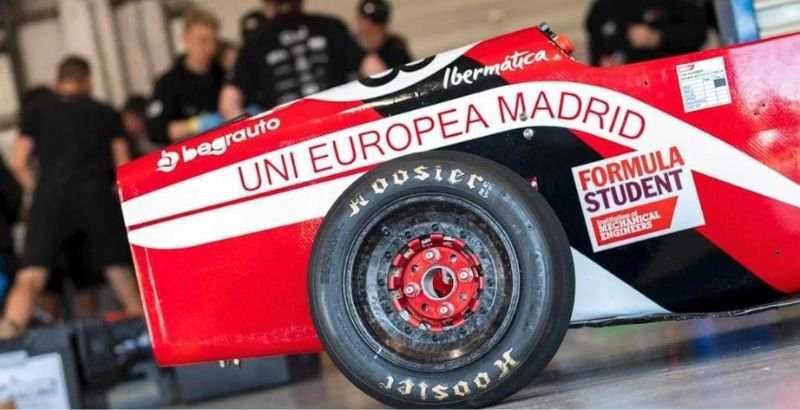This engineering competition, in which universities from all over the world take part, involves presenting a prototype designed, manufactured and tested by the students.

Students at the Universidad Europea who are members of the Motor Club Formula UEM have recently taken part in the Formula Student Spain competition. This is an engineering competition, in which universities from all over the world take part, and involves presenting a prototype designed, manufactured and tested by the students. Strict rules were established for all competing teams.
Rodrigo Cabana, president of the club told us that it was “incredible experience which we learnt so much from. Every phase of the competition was challenging and required effort. A project of this calibre, among so many people, requires a lot of organisation and communication to deliver the documents on time – just like in a real company. It helps you further develop your design skills and forces you to learn things yourself, all the while following a strict set of rules. You significantly develop your creativity as a result”.
“We are quite satisfied with the results. Seeing the car go out and compete fills us with pride. We have seen substantial improvement compared to July’s competition. We know there is still a lot to improve in the design and cost stage. We are also missed out on some opportunities in acceleration and autocross. You can see how other teams work in the competition and how they interpret the rules. You can also learn a lot from the jury as they offer their experience in the feedback”.
Different experts took part in this competition, namely Alejandro Leal, Alexander Smith, Carlos Saval, David Vergara, Imanol Frutos, Javier Quirós, Jorge Orellana, Juan Alberto García and Manuel Martínez from the aerospace sector; Andrés Alcalde, Carlos Rodriguez, Claudia Jiménez, David Hernández, Erick lesta, Gonzalo Soliverdi, Lorena Cota, Matthew Herrera, Michele Ambrosini and Rodrigo Cabana from industrial engineering; and Laura Rico from the field of biomedical engineering.
The Student Formula Spain was made up of three blocks:
- The Scrutineering: Involves an exhaustive technical revision to guarantee vehicle safety abiding by the rules. Once this phase is approved, teams can take part in dynamic events.
- Dynamics: these are the events in which the formula car competes. They involve five tests which are scored and are measured in four events:
- 1) Skid pad: A figure of eight circuit of quite small radius. The pilot has to enter this circuit and make two laps to the right and then two to the left to finally exit the circuit and stop the clock.
- 2) Acceleration: Measures the time on a straight.
- 3) Autocross or Sprint: Consists of two laps of a 1 km circuit where the aim is to record the lowest time.
- 4) Endurance: This test measures two things: design reliability and efficiency. The car, with a full tank of petrol, must be able to complete 22 km on a circuit. At the end of the test, the remaining fuel is measured to determine the efficiency.
- Statics: scored over three variables. These are:
- Design: technical reasoning behind the car’s design, plus the team management and organisation.
- Cost: Justifying how and why the formula car has been built.
- Business: Presenting the car as a profitable business model before a jury acting as an investor group.